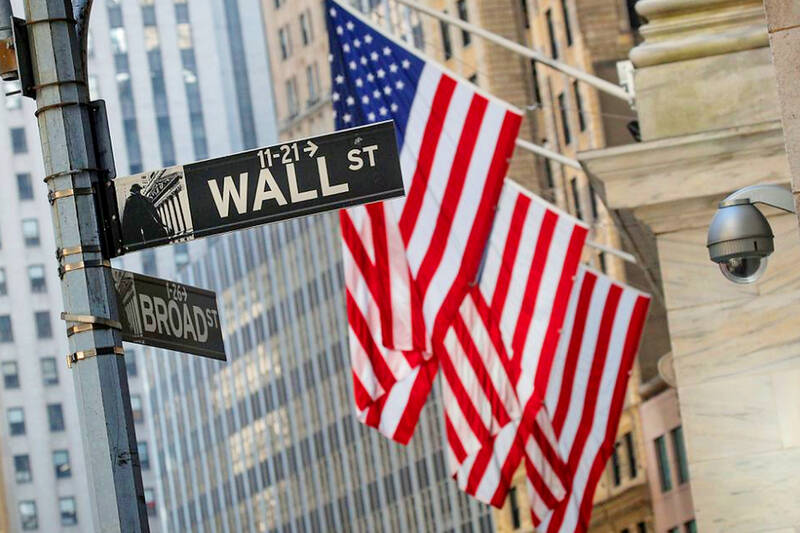A US congressional committee on China is to hold a war game simulating a Chinese invasion of Taiwan with financial and business executives in New York to show the risks of investing in China, the Financial Times reported yesterday.
US House Select Committee on the Strategic Competition Between the United States and the Chinese Communist Party Chairman Mike Gallagher and US Representative Raja Krishnamoorthi are tomorrow to lead the simulation, the newspaper said, citing an unnamed source close to the committee.
The participants are to include representatives from investment banks, current and former pharmaceutical company executives, and retired high-ranking US military officers, the Financial Times said.

Photo: Reuters
The panel is expected to meet Wall Street executives to scrutinize how potential US investment in China could harm US national security.
On Tuesday, they are to hold a hearing that would include testimony from former US Securities and Exchange Commission chairman Jay Clayton and investment manager Jim Chanos.
The Financial Times quoted the source as saying that the lawmakers wanted comments from the financial community about “the systemic risks that come with American capital flowing to China and how banks and other financial institutions think about their investments in China and exposure to the Chinese economy in the event of a political crisis.”
The war game is to explore the economic ramifications of a conflict between the US and China over Taiwan.
The US representatives in April attended a war game in Washington that “raised questions about whether the US and its allies were doing enough to prepare for sanctions on China and an economic war with Beijing,” the Financial Times said.
Earlier this year, the committee met Apple chief executive officer Tim Cook and Disney chief executive officer Bob Iger in several discussions that showed that Hollywood and Silicon Valley entrepreneurs underestimate the risk of war in Taiwan, Gallagher told the Financial Times.
Krishnamoorthi was quoted as saying that it was “important that our committee hear from the financial industry about how [Chinese Communist Party] policies are affecting Americans’ savings and investments and what Congress needs to do to help protect American investors and our national security.”
The bipartisan committee was established in January to assess and manage the national security threat posed by China. It has also addressed issues such as Beijing’s predatory economic practices and human rights transgressions.

MAKING WAVES: China’s maritime militia could become a nontraditional threat in war, clogging up shipping lanes to prevent US or Japanese intervention, a report said About 1,900 Chinese ships flying flags of convenience and fishing vessels that participated in China’s military exercises around Taiwan last month and in January last year have been listed for monitoring, Coast Guard Administration (CGA) Deputy Director-General Hsieh Ching-chin (謝慶欽) said yesterday. Following amendments to the Commercial Port Act (商港法) and the Law of Ships (船舶法) last month, the CGA can designate possible berthing areas or deny ports of call for vessels suspected of loitering around areas where undersea cables can be accessed, Oceans Affairs Council Minister Kuan Bi-ling (管碧玲) said. The list of suspected ships, originally 300, had risen to about

DAREDEVIL: Honnold said it had always been a dream of his to climb Taipei 101, while a Netflix producer said the skyscraper was ‘a real icon of this country’ US climber Alex Honnold yesterday took on Taiwan’s tallest building, becoming the first person to scale Taipei 101 without a rope, harness or safety net. Hundreds of spectators gathered at the base of the 101-story skyscraper to watch Honnold, 40, embark on his daredevil feat, which was also broadcast live on Netflix. Dressed in a red T-shirt and yellow custom-made climbing shoes, Honnold swiftly moved up the southeast face of the glass and steel building. At one point, he stepped onto a platform midway up to wave down at fans and onlookers who were taking photos. People watching from inside

Japan’s strategic alliance with the US would collapse if Tokyo were to turn away from a conflict in Taiwan, Japanese Prime Minister Sanae Takaichi said yesterday, but distanced herself from previous comments that suggested a possible military response in such an event. Takaichi expressed her latest views on a nationally broadcast TV program late on Monday, where an opposition party leader criticized her for igniting tensions with China with the earlier remarks. Ties between Japan and China have sunk to the worst level in years after Takaichi said in November that a hypothetical Chinese attack on Taiwan could bring about a Japanese

STREAMLINED: The dedicated funding would allow the US to transfer equipment to Taiwan when needed and order upgraded replacements for stockpiles, a source said The US House of Representatives on Thursday passed a defense appropriations bill totaling US$838.7 billion, of which US$1 billion is to be allocated to reinforcing security cooperation with Taiwan and US$150 million to replace defense articles provided to the nation. These are part of the Consolidated Appropriation Act, which the US House yesterday passed with 341 votes in favor and 88 against. The act must be passed by the US Senate before Friday next week to avoid another government shutdown. The US House Committee on Appropriations on Monday unveiled the act, saying that it allocates US$1 billion for the Taiwan Security Cooperation Initiative